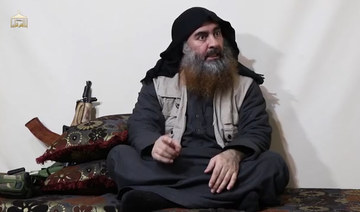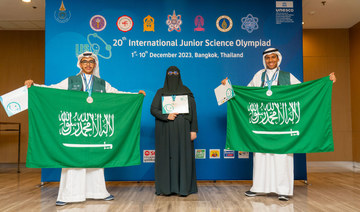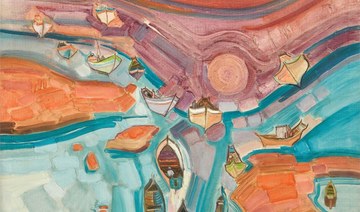BAGHDAD: Every evening at the Muntada Al-Masrah theater on Baghdad’s Rashid street, the cast and crew of the first TV drama filmed in Iraq in seven years take their places among the rooms and courtyard of this 19th-century building and shoot new scenes of their highly-anticipated series.
The arts are coming to life again in Baghdad, bringing with it a touch of hope and comfort as the country works to rebuild after 16 years of war.
And after two decades abroad, two of Iraq’s leading actors have returned to take part in “The Hotel,” the twenty-episode drama set to air during the Islamic holy month of Ramadan.
“The Iraqi people are parched for drama,” said Hassan Hosni, a drama star of the 1990s, who returned from Saudi Arabia to direct “The Hotel,” a show about the seedy underbelly of Baghdad and its entanglement with human trafficking.
It is the first Ramadan drama to be produced in Iraq since 2012, according to the cast and crew, and it heralds a return of an essential TV genre to the country.
Across the Muslim world and throughout the month of Ramadan, when the faithful fast from dawn until sunset and stay up late to digest their evening meals, viewers are treated to TV dramas that touch on romance, war, tyranny and other issues of the day.
For years, Iraqis have been watching dramas from other nations, such as “Bab Al-Hara,” the blockbuster Syrian series set during the 1930s independence movement from France.
With “The Hotel,” Iraqis will have a home-grown series to watch for the first time in years, amid the longest stretch of stability Baghdad has experienced since the 2003 US invasion.
“We were all waiting for this moment — writers, directors and actors — with total impatience,” said Hosni.
“I felt it in the streets, when we were scouting for locations,” said Hosni. Locals, shocked to see him back in their city, approached the star to ask about the series.
“The joy was clear in their eyes, expressions and words,” he said.
Once the capital of the Islamic world, Baghdad is a city that proudly displays its affection for drama and poetry, boasting monuments that show scenes from Arabian Nights and avenues named after renowned poets such as the boastful Mutanabbi of the 10th century and his bibulous predecessor, Abu Nawas.
It has held on to this pride through the contemporary era, even as the coups and wars of the 20th century, the tyranny of Saddam Hussein and the grip of UN sanctions drove writers, actors and producers out of the country.
Mahmoud Abu Al-Abbas, the star of “The Hotel” and a famous thespian in his own right, went into exile in 1997 after he performed a solo play that spoke about harassment by the country’s notorious security services. In Saddam Hussein’s era, it crossed a red line.
“I was interrogated for two days and then advised by the minister of culture to leave Iraq immediately,” he said.
The 2003 US invasion dealt another blow to the arts. The ensuing war tore Baghdad apart, as car bombs tore through the city daily, and fighting turned Rashid Street, once a center of culture and heritage, into a valley of fear and destruction.
A sputtering revival earlier this decade came to a halt, first as money for the arts dried up, then as insecurity gripped the country again with the 2014 Daesh group insurgency.
After Iraq declared victory over IS in December 2017, the atmosphere inside the capital began to change. The blast walls that protected against car bombs were lifted, and locals started staying out late again, patronizing cafes, malls, galleries, and theaters, where performances change from week to week.
Abu Al-Abbas stayed in the United Arab Emirates for 20 years. But he kept acting, writing and directing plays, and he wrote more than a dozen books on his craft.
In 2017, he returned to his hometown of Basra, the commercial capital of southern Iraq and the hub for its oil, where he founded a theater troupe of young, under-employed local men and taught them a play they went on to perform in other southern cities.
But it wasn’t until screenwriter Hamid Al-Maliki called with the script for “The Hotel” that he agreed to return to the screen.
“Violent drama takes a period of contemplation on the part of the writer so that he can give us a ‘dose’ of work that can treat our situation,” said Abu Al-Abbas.
Al-Maliki accepted that “The Hotel’s” transgressive material — including prostitution, human trafficking and the organ trade — would shock viewers, but said it was the responsibility of TV drama to start a conversation.
“It’s a current matter for Iraq,” he said. “It’s a message to the youth to beware of the trap of human trafficking, and it’s a message to the Iraqi state to care for the innocent and the poor who are the victims of the trade.”
And Al-Maliki said it was vital for the arts to confront the ideologies that have fueled extremism.
“Culture alone is what will be victorious over Daesh thinking,” he said, using the Arabic term for the Daesh group.
“Culture is life, and Daesh is death. So we must face death with life. We must face Daesh with culture,” he continued.
Hosni, the star-turned-director, left Iraq in 1996, looking to escape the pressure of the UN sanctions levied against Iraq after Saddam Hussein invaded Kuwait earlier in the decade.
But he never felt far from Iraq, as he continued to work with other diaspora Iraqis in drama in Syria, Lebanon, Jordan and Saudi Arabia.
“It was a separation in body, but not in mind or soul,” he said.
He was finally coaxed back by Al-Maliki this year.
The return of the TV drama, Hosni said, is reassuring.
“It’s a time for the Iraqi family to sit together at home, with their relatives and neighbors.”
In time for Ramadan, Iraqi TV drama returns after 7 years
In time for Ramadan, Iraqi TV drama returns after 7 years
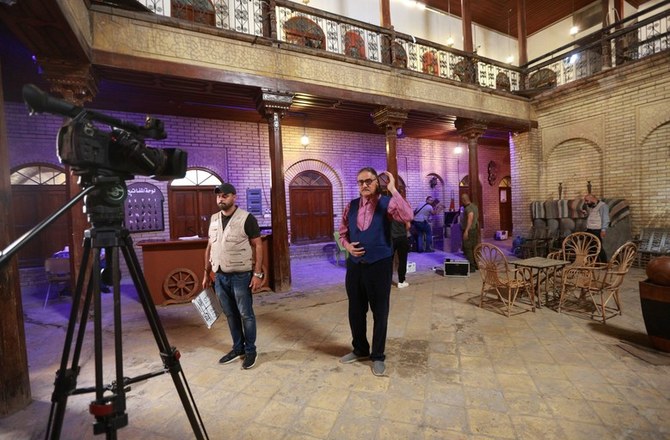
- Two of Iraq’s leading actors have returned to take part in “The Hotel,” a Ramadan drama
- It is the first Ramadan drama to be produced in Iraq since 2012
DJ Peggy Gou makes waves in the Middle East, eyes collaborations with Arab artists

ABU DHABI: South Korean DJ and singer Peggy Gou is no stranger to the Middle East. She wowed fans this week at the Louvre Abu Dhabi in the UAE, performing in celebration of the newly opened exhibition “From Kalila wa Dimna to La Fontaine: Travelling through Fables,” and revealed that she would consider collaborating with Arab artists.

She told Arab News the morning after the event: “I woke up this morning and was thinking what happened last night. It is one of those events that is so meaningful. I’ve been to Abu Dhabi twice just to see the exhibitions. It’s more than a museum to me. It is a community, where people even go to hang out. That’s how beautiful that place is.”
Gou was among the first performers to take the stage at the Louvre Abu Dhabi in front of an audience, she said.
“I know David Guetta did it once before without an audience during COVID-19 … It was my first time playing in Abu Dhabi. It was insane. It was a very, very special night, and I want to do more,” she added.

Gou incorporates Arab-inspired music into her performances, noting that “people just love it, and they love percussion.”
To the artist, music is like a feeling. “It is really hard to rationalize it,” she said. “When you love it, you just love it,” she added, expressing her admiration for Arab melodies.
“This is maybe the reason why people support my music, even though they don’t understand the language. Sometimes they just feel it, they just love it,” she explained.
“I love our music, but at the same time, I’m considering collaborating with an Arab artist because there are a lot of talented Arab musicians here,” she said. “I have many friends here who recommended me some artists, and I want to check it out.
“I never say no. I love making music with different languages.”
Gou has performed in Saudi Arabia multiple times.
“Every time I go there, it’s different. But what I can say is it’s always changing in a good way. In the very beginning, I felt like they weren’t going to understand my music,” she recalled.
But the DJ said that her last performance in AlUla was one of her favorites. “People were just shouting, screaming, and dancing as if there was no tomorrow,” she said.
Saudi students explore intersection of science and art
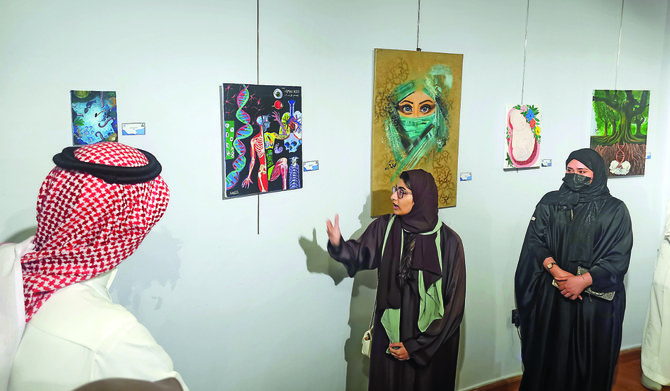
- Exhibition organized by the Saudi Arabian Society for Culture and Arts runs until May 2
JEDDAH: The Saudi Arabian Society for Culture and Arts has launched an exhibition in Jeddah showcasing 25 artworks exploring the link between science and art.
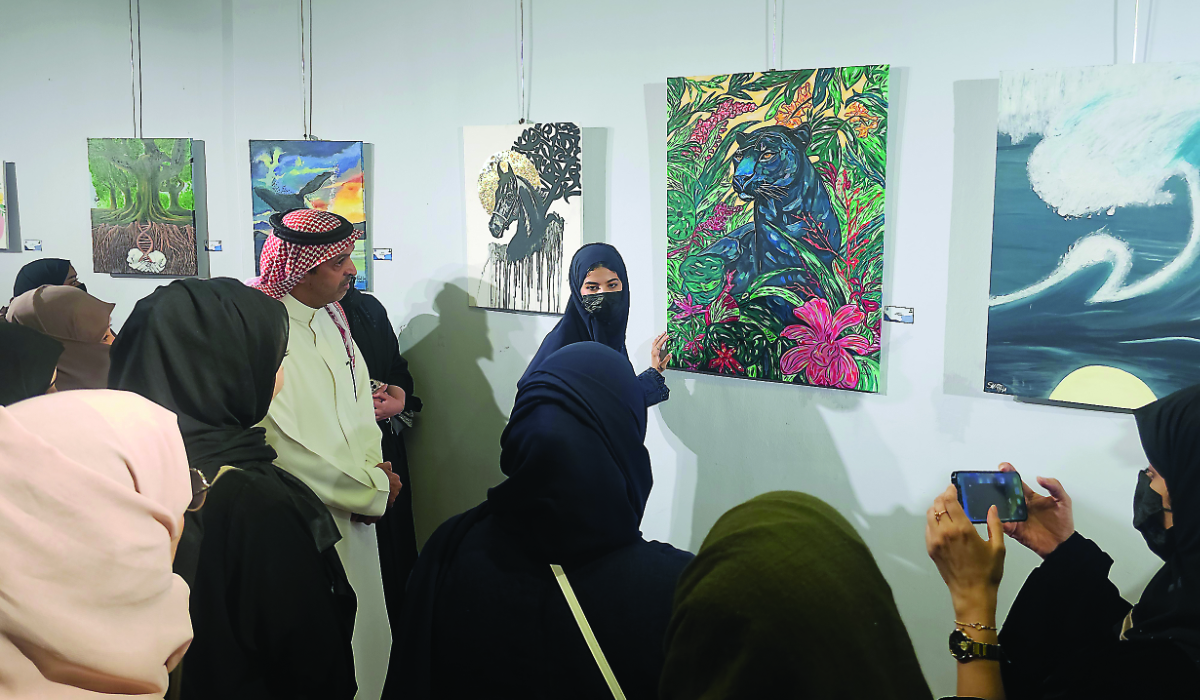
The second annual exhibition organized by the arts society, in collaboration with the Biology Club at King Abdulaziz University, was opened in the presence of Mohammed Al-Subaih, director-general of the organization, Mona Al-Harbi, vice dean of the college of science, local artists, and parents.
HIGHLIGHTS
• The Sci-Art exhibition was organized by the Saudi Arabian Society for Culture and Arts in collaboration with the Biology Club at King Abdulaziz University.
• It is being held to encourage students to showcase their creativity.
The exhibition, which will run until May 2 at the organization’s Abdul Halim Radwi Auditorium, presents an artistic interpretation of scientific inquiry. It is being held to encourage students to showcase their creativity.
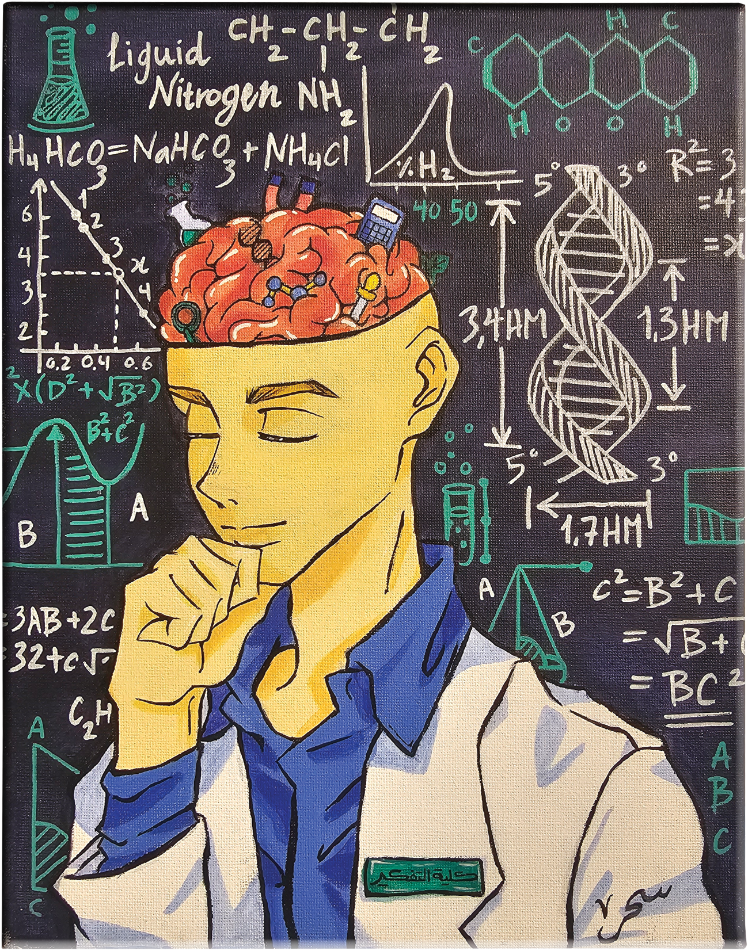
Fifteen female students presented their paintings, sketches and other projects at the opening of the event.
The students chose as subject matter the body’s various systems, the solar system, human mind, natural world, animals, mathematics, computer programming, global warming and more.
The Sci-Art exhibition allows participants to engage their creative and analytical minds to forge new connections between ideas and learn about the world through art.
Mona Al-Harbi, Vice dean of the college of science, King Abdulaziz University
Al-Subaih praised the students for their work. “This exhibition comes as part of our role in spreading culture and arts … we thought of creating a platform for students to exhibit their talents and showcase their innovative ideas and this exhibition is an exciting moment for us to share with our community.”
Al-Harbi added: “The sci-art exhibition allows participants to engage their creative and analytical minds to forge new connections between ideas and learn about the world through art.
“This exhibition is a way to provide a platform for students and others to express that side of themselves and bring art and science together. Our aim is to encourage students to show their artistic talents and create paintings that related to subjects that they have learned in science.”
‘Chicago’ musical to hit the stage in the UAE
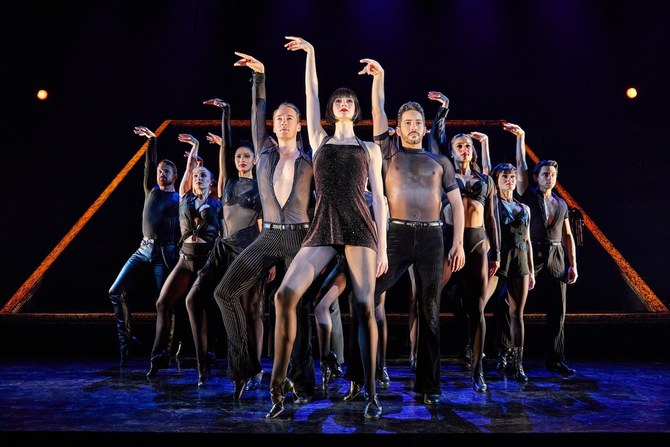
DUBAI: “Chicago,” the American musical with the longest Broadway tenure, is set to be performed in the UAE in September.
The musical will hit the stage at Abu Dhabi’s Etihad Arena for a limited run from Sept.12-22.
“Chicago” is a tale of passion, murder, greed, betrayal and redemption through the journey of two competitive women – an aspiring jazz performer, Roxie Hart, and a former vaudeville star, Velma Kelly.
The production spawned numerous beloved tunes such as “All That Jazz,” “Cell Block Tango” and "Razzle Dazzle.”
Since its premiere on Broadway New York 27 years ago, “Chicago” has played in major cities around the world like London, Sydney, Tokyo, Seoul, Paris, Berlin and Madrid.
Emily Blunt, Ryan Gosling laud stunt performers in ‘The Fall Guy’
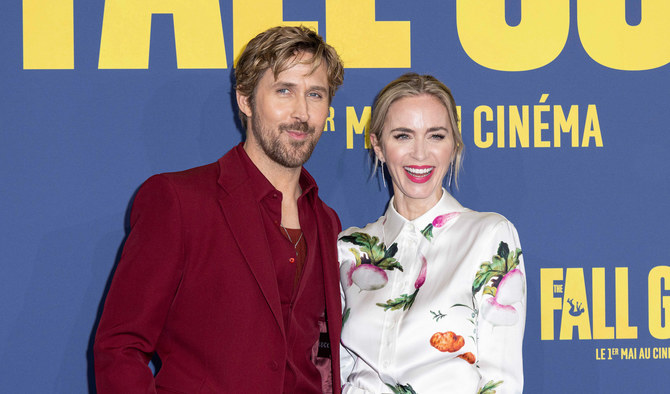
TEXAS: Hollywood stars Emily Blunt and Ryan Gosling pay tribute to stunt actors in a film by director David Leitch, who himself started as a stunt actor. Loosely based on the 1980s TV series about stunt performers, “The Fall Guy,” which releases in Saudi Arabia on Thursday, is billed as blending humor, romance, mystery, and action.
“It's a celebration of our incredible industry and this film is about that, but it's really to just broadcast the incredible and indelible work of stunt performers and what they've done for cinema,” Blunt said in an interview with Arab News.
“What they've done for people's entertainment … they've risked life and limb to give people that crackling sense of wonder that you feel in movies and it's time they got their outing,” she added.
In a challenge to the invasion of digital effects in film, not only is “The Fall Guy’ packed with stunts but it has officially set a Guinness World Record for the most cannon rolls in a car, performed by stunt driver Logan Holladay. Eight-and-a-half rolls broke the previous record of seven, set by Adam Kirley for 2006’s “Casino Royale.”
Gosling praised the film for giving a platform to stunt performer.
“I had a stunt double my whole life. And it's always been this strange dynamic where they come in, they do all the cool stuff, and then they go and hide and you pretend like you did it and it's not cool, it's about time that recognize (their work),” he said.
The film follows the story of Colt Sievers, a stuntman who left his job to focus on his own health. When the star of a big-budget movie directed by his ex-girlfriend goes missing, he is recalled to active duty.
“Ted Lasso” star Hannah Waddingham also stars in the film. The British actress shed light on what the movie means to her.
“You know, we shot it this time last year in Sydney. Starting in late November, October time. So to finally be here, I feel like I've had to keep a lid on it for so long. And my brother and I were obsessed with “The Fall Guy” when I was little, when I was like ten years old so it's so lovely,” she said.
Heba Ismail brings Saudi representation to NFT ecosystem
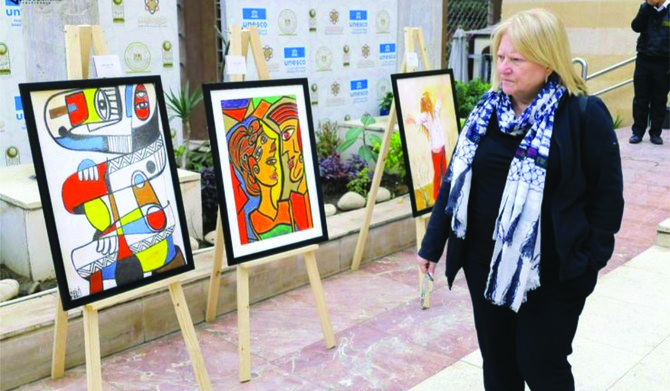
- Heba Ismail is highlighting ways for artists to flourish in the digital world
JEDDAH: Saudi artist Heba Ismail showcased her work at the Outer Edge Innovation Summit in Riyadh this week.
Commenting on her experience at the summit as one of the first Saudi artists to venture into the Web3 art scene, she said: “Having my paintings displayed on the event screens is a tremendous honor, offering global visibility and inspiring more Saudi and Arab artists to explore the diverse options available for sharing their art with the world.
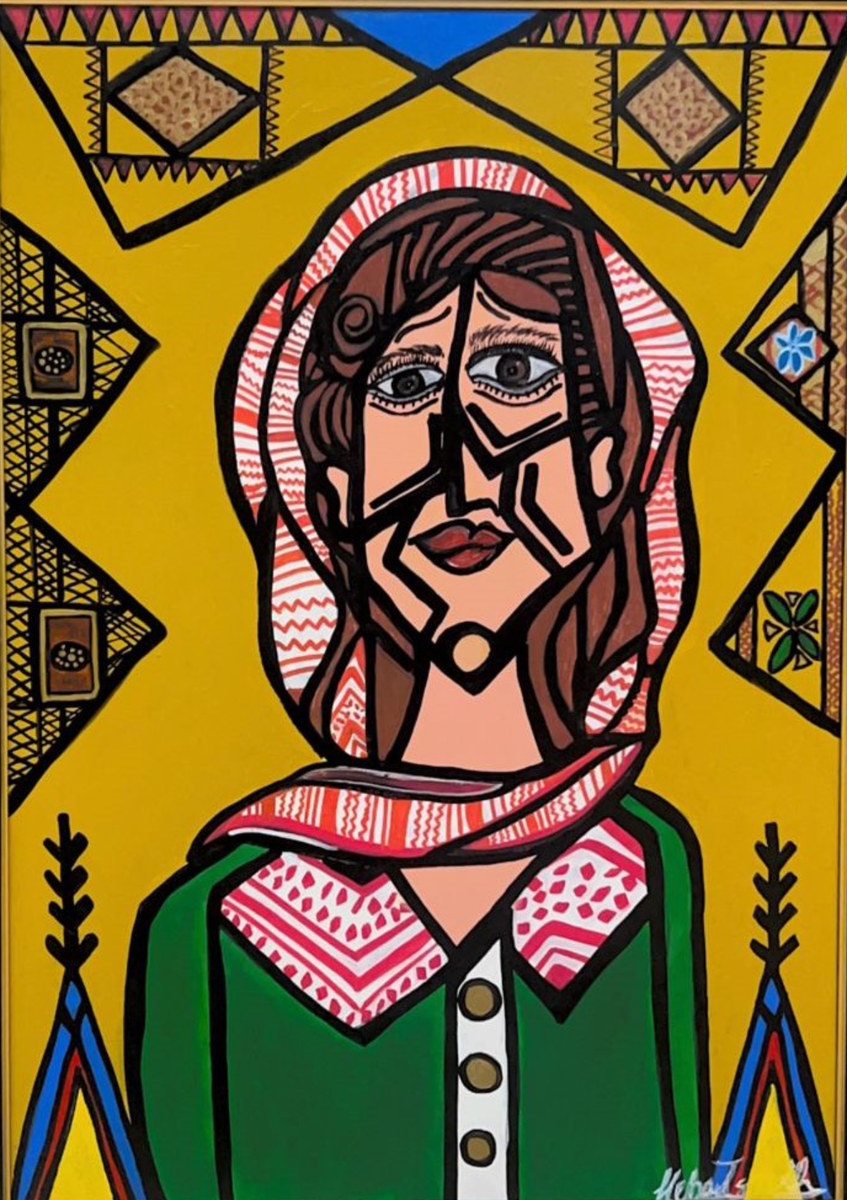
“Through my participation with Nuqtah, the first Saudi NFT platform, I am eager to present my art on a global stage and connect with audiences in innovative ways,” she continued.
Non-fungible tokens — or NFTs — are, in this scenario, digital tokens that can be redeemed for a digital art work. Ismail is exploring their potential in the Saudi art scene.
HIGHLIGHTS
• With a professional background in dentistry, Heba Ismail found parallels between that meticulous work and her own creative process.
• Partnering with ChainVisory, a blockchain consultancy company, Ismail launched the Hebaism brand.
• It combines NFTs and original paintings, providing collectors with both digital and physical assets.
For Ismail, art has always been more than just a hobby — it’s been a lifelong calling. With a professional background in dentistry, Ismail found parallels between that meticulous work and her own creative process.
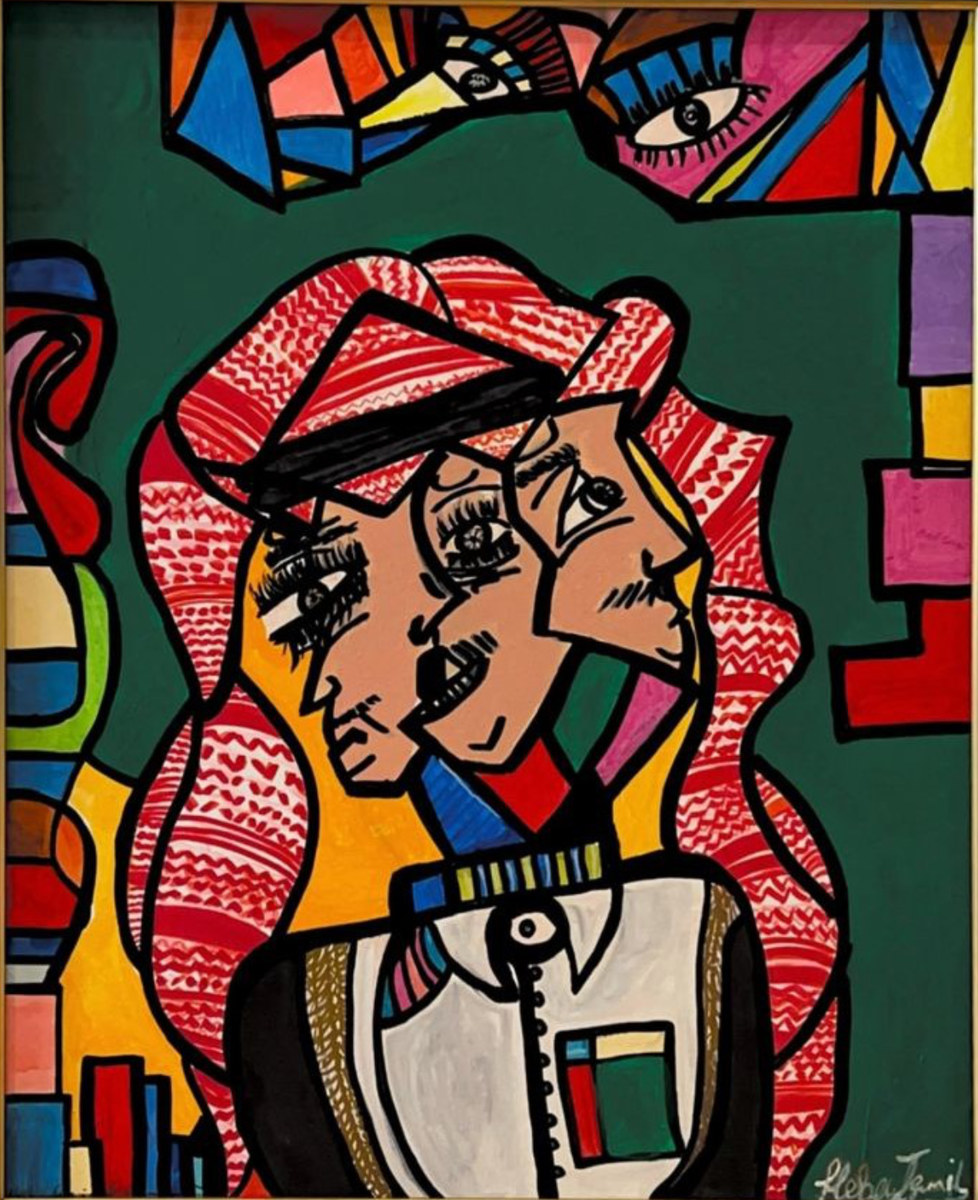
Inspired by movements including cubism, fauvism, and surrealism, Ismail’s art is a fusion of diverse influences and personal narratives “Each face represents a feeling and a vision documented on a painting. I paint poetry, and often times each piece is accompanied by a poem,” she said. “As a Saudi female, most of my paintings represent myself and my Saudi culture, which I am proud of. The characters are coded feelings, faces that tell a story — either joy, sadness, or acrimony.”

Her introduction to NFTs came in 2021, sparking a fascination with the technology and its potential. Partnering with ChainVisory, a blockchain consultancy company, Ismail launched her Hebaism brand, which combines NFTs and original paintings, providing collectors with both digital and physical assets.
As a female Saudi artist, I want to leave a mark and impact on every art platform, putting Saudi art on the map worldwide.
Heba Ismail, Saudi artist
“I wanted to keep the authentic classical painting process, yet the NFT world gave me a chance to meet and discover different ways to share my art and build a name and a brand,” she said. “It’s been an enlightening journey, uncovering the futuristic art process and connecting with a vibrant community through Web3.”
Ismail hopes to inspire other artists in the region to explore new avenues for artistic expression.
“As a female Saudi artist, I want to leave a mark and impact on every art platform, putting Saudi art on the map worldwide,” she said.



